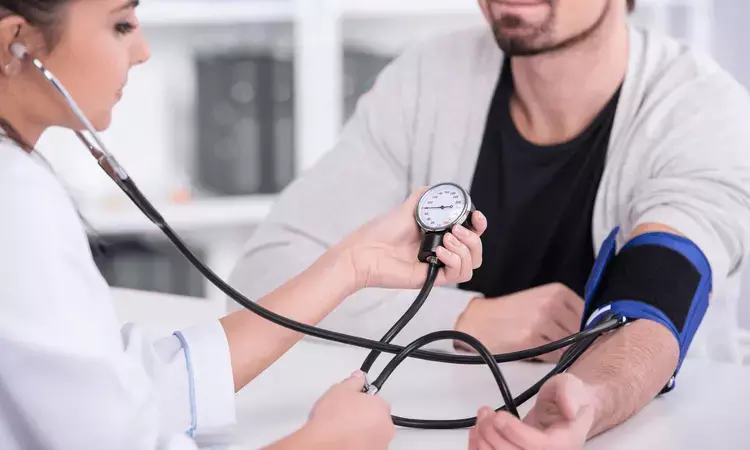- Home
- Medical news & Guidelines
- Anesthesiology
- Cardiology and CTVS
- Critical Care
- Dentistry
- Dermatology
- Diabetes and Endocrinology
- ENT
- Gastroenterology
- Medicine
- Nephrology
- Neurology
- Obstretics-Gynaecology
- Oncology
- Ophthalmology
- Orthopaedics
- Pediatrics-Neonatology
- Psychiatry
- Pulmonology
- Radiology
- Surgery
- Urology
- Laboratory Medicine
- Diet
- Nursing
- Paramedical
- Physiotherapy
- Health news
- Fact Check
- Bone Health Fact Check
- Brain Health Fact Check
- Cancer Related Fact Check
- Child Care Fact Check
- Dental and oral health fact check
- Diabetes and metabolic health fact check
- Diet and Nutrition Fact Check
- Eye and ENT Care Fact Check
- Fitness fact check
- Gut health fact check
- Heart health fact check
- Kidney health fact check
- Medical education fact check
- Men's health fact check
- Respiratory fact check
- Skin and hair care fact check
- Vaccine and Immunization fact check
- Women's health fact check
- AYUSH
- State News
- Andaman and Nicobar Islands
- Andhra Pradesh
- Arunachal Pradesh
- Assam
- Bihar
- Chandigarh
- Chattisgarh
- Dadra and Nagar Haveli
- Daman and Diu
- Delhi
- Goa
- Gujarat
- Haryana
- Himachal Pradesh
- Jammu & Kashmir
- Jharkhand
- Karnataka
- Kerala
- Ladakh
- Lakshadweep
- Madhya Pradesh
- Maharashtra
- Manipur
- Meghalaya
- Mizoram
- Nagaland
- Odisha
- Puducherry
- Punjab
- Rajasthan
- Sikkim
- Tamil Nadu
- Telangana
- Tripura
- Uttar Pradesh
- Uttrakhand
- West Bengal
- Medical Education
- Industry
Ibrutinib use associated with high blood pressure, finds BMJ study

USA: Ibrutinib, a medication used for the treatment of certain cancers, is associated with the development of hypertension and worsening of blood pressure, a recent study has found. The researchers caution cardiologists and oncologists to be aware of this cardiotoxicity to allow timely management of BP elevations. The study findings are published in the BMJ journal Heart.
Ibrutinib is a tyrosine kinase inhibitor that is associated most commonly with atrial fibrillation. However, previous studies have identified additional cardiotoxicities including accelerated hypertension. There is no firm information on the incidence and risk factors of new or worsening hypertension following ibrutinib treatment.
Dae Hyun Lee, University of South Florida College of Medicine, Tampa, Florida, USA, and colleagues conducted a retrospective study of 144 patients diagnosed with B cell malignancies treated with ibrutinib (n=93) versus conventional chemoimmunotherapy (n=51). Their effects on blood pressure were then evaluated at 1, 2, 3, and 6 months after treatment initiation.
On analysis, the researchers found the following:
· Both treatments had similar prevalence of baseline hypertension at 63.4% and 66.7%, respectively.
· There were no differences between treatments by age, sex and baseline cardiac comorbidities.
· Both systolic and diastolic blood pressure significantly increased over time with ibrutinib compared with baseline, whereas conventional chemoimmunotherapy was not associated with significant changes in blood pressure.
· Baseline hypertensive status did not affect the degree of blood pressure change over time.
· A significant increase in systolic blood pressure (defined as more than 10 mm Hg) was noted for ibrutinib (36.6%) compared with conventional chemoimmunotherapy (7.9%) at 1 month after treatment initiation.
Despite being hypertensive at follow-up, 61.2% of patients who were treated with ibrutinib did not receive adequate blood pressure management (increase or addition of blood pressure medications).
· Within the ibrutinib group, of patients who developed more than 20 mm Hg increase in systolic blood pressure, only 52.9% had hypertension management changes.
"Ibrutinib is associated with the development of hypertension and worsening of blood pressure," wrote the authors. "Cardiologists and oncologists must be aware of this cardiotoxicity to allow timely management of blood pressure elevations."
Reference:
The study titled, "Association between ibrutinib treatment and hypertension," is published in the BMJ journal Heart.
DOI: https://heart.bmj.com/content/early/2021/06/30/heartjnl-2021-319110.full
Dr Kamal Kant Kohli-MBBS, DTCD- a chest specialist with more than 30 years of practice and a flair for writing clinical articles, Dr Kamal Kant Kohli joined Medical Dialogues as a Chief Editor of Medical News. Besides writing articles, as an editor, he proofreads and verifies all the medical content published on Medical Dialogues including those coming from journals, studies,medical conferences,guidelines etc. Email: drkohli@medicaldialogues.in. Contact no. 011-43720751


